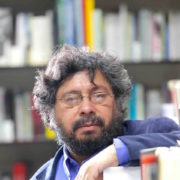Three Poems from Mandelstam Street
I.
Winter sits heavy in our guts
and we can no longer chew
—in confident, elegant pride—
herbs, bark, and rocks
on the rough roads of the diaspora.
Poetry left
wrinkles around our eyes and tongue
a miniature egg wrapped in a cloth
and the smoke of a train leaving
for the gray snow of Revolution.
But to grow old is nothing new
and travel is only a way
—like so many others—
to imagine beautiful landscapes,
while tall guards escort us
through long, cold platforms
toward a new happiness.
II.
Patiently contemplate in your shacks
the snowfall covering a flock of storks,
chasing deep into the night
the eastern reddish firmament.
Listen to the mice of the tundra
procreate among frozen underbrush
igniting hope in their pupils
like suns devouring themselves.
Don’t fall asleep, prisoner,
stay up and sing in the plains of insomnia
to the future that lays like a fossil
under ice hardened by the light.
III.
We have talked enough
about death,
now we must let
the cemeteries thaw
and the light settle
among the leaves and graves.
We searched long years
for consolation,
for any sign
among the dismal flowers.
Swelled with memories
and tears
we hardly heard
of new births.
The boys grew up,
became men
and walked tirelessly
through the world’s ravines.
And suddenly they returned
looking for their place
in the deep root
of our eyes.
Our ancient memory
opened their doors.
We saw moss on the windows
horses grazing among the weeds,
the moon’s path
in frozen puddles.
Time revealed its compassion
and carved a new torrent
in the wide
mountain rapids.
I.
Sentimos el invierno en el estómago,
y no podemos, como antes, mordisquear
-con vano y fino orgullo-
hierbas, cortezas y piedras
en los ásperos caminos de la diáspora.
La poesía nos dejó
arrugas en los ojos y en la lengua,
un huevo diminuto envuelto en un pañuelo
y el humo del tren que parte
hacia la nieve gris de la Revolución.
Pero envejecer no es nada nuevo
y viajar sólo es un modo
-como lo son tantos otros de
imaginar bellos paisajes,
mientras altos guardianes nos escoltan
por largos y fríos andenes
hacia la nueva felicidad.
II.
Contemplad en las barracas con paciencia
la nevada que atraviesan las cigüeñas,
persiguiendo a altas horas de la noche
el rojizo firmamento del oriente.
Escuchad a los ratones de la tundra
procrearse entre yerbajos escarchados
encendiendo la esperanza en sus pupilas
como soles devorándose a sí mismos.
No te quedes dormido, prisionero,
vela y canta en las estepas del insomnio
al futuro que yace como un fósil
bajo el hielo endurecido por la luz.
III.
Ya hemos hablado demasiado
de la muerte,
ahora hay que dejar
que los cementerios se entibien,
que la luz haga lo suyo
entre las hojas y las lápidas.
Buscamos largos años
un consuelo,
un signo diminuto
entre las flores luctuosas.
Hinchados de recuerdos
y de lágrimas
apenas supimos
de nuevos nacimientos.
Crecieron los muchachos,
se hicieron hombres,
caminaron sin descanso
por los desfiladeros del mundo.
Y de pronto volvieron
buscándose un lugar
en la honda raíz
de nuestros ojos.
Nuestra vieja memoria
abrió sus puertas.
Vimos musgo en las ventanas,
caballos pastando en la maleza,
el paso de la luna
en los charcos congelados.
El tiempo sí tuvo compasión
y dejó un torrente nuevo
en los anchos y ligeros
ríos montañeses.
Translator’s note:
Mandelstam Street explores the relationship between art and exile by evoking the figure of Russian poet Osip Mandelstam (1891-1938), known for his defiance of Joseph Stalin’s repressive rule. What can a 21st-century indigenous South American writer and Mandelstam have in common? These poems speak of loss, political persecution, displacement, and the task of writing about such experiences, often silenced by oppression or fear. Through Mandelstam, Huenún takes us into the frozen Siberian Tundra, to the heart of silence, to reflect on creating art against all odds. Far from the lush forests of southern Chile, this scenario offers a metaphor for the problems afflicting many Mapuche artists and writers, forced to negotiate their identities between cultural heritage and the larger dominant society. In these poems Huenún evokes what it means to be an exile in one’s own country. The original poems were published in La calle Mandelstam y otros territorios apócrifos. (Santiago de Chile: Fondo de Cultura Económica, 2016.) The book, set to go to the printers next week, gathers several full volumes of Huenún’s poetry.
This latest volume of poetry forms part of Huenún’s ongoing project to engage in dialogue with prominent intellectual figures from universal history, such as George Trakl and Frantz Fanon. In doing so, he writes poems that are charged with diverse experiences of language and politics, connecting local literary and social concerns with a wider context. Consequently, the original poems are also suggestive of the process of translation, since Huenún reads these authors translated from the Russian, German, and French into Spanish. Bringing this poetry into English, therefore, reveals the routes which language can travel over time and geographies, taking on new forms and meanings.

Thomas Rothe (Berkeley, California, 1985) has published translations of poetry in Amerarcana, Jacket2, and The Brooklyn Rail’s InTranslation. He is the author of several critical essays published or forthcoming in academic journals, including Sargasso (University of Puerto Rico) and Revista de Estudios Hispánicos (Washington University in St. Louis). He is currently pursuing a doctorate in Latin American Literature at the Universidad de Chile. He can be reached at .
 Jaime Luis Huenún was born in 1967 in Valdivia, southern Chile. He is a Huilliche-Mapuche writer and currently one of the most distinguished voices in contemporary Chilean poetry. His books include Ceremonias (1999), PuertoTrakl (2001), Reducciones (2012), Fanon City Meu (2014), and La calle Mandelstam y otros territorios apócrifos (2016). He has received numerous awards, including the Municipality of Santiago Poetry Prize (2000), the Pablo Neruda Prize (2003), a Guggenheim Fellowship (2005), and the Chilean Ministry of Culture’s Best Work of Literature 2013 for Reducciones.
Jaime Luis Huenún was born in 1967 in Valdivia, southern Chile. He is a Huilliche-Mapuche writer and currently one of the most distinguished voices in contemporary Chilean poetry. His books include Ceremonias (1999), PuertoTrakl (2001), Reducciones (2012), Fanon City Meu (2014), and La calle Mandelstam y otros territorios apócrifos (2016). He has received numerous awards, including the Municipality of Santiago Poetry Prize (2000), the Pablo Neruda Prize (2003), a Guggenheim Fellowship (2005), and the Chilean Ministry of Culture’s Best Work of Literature 2013 for Reducciones.




